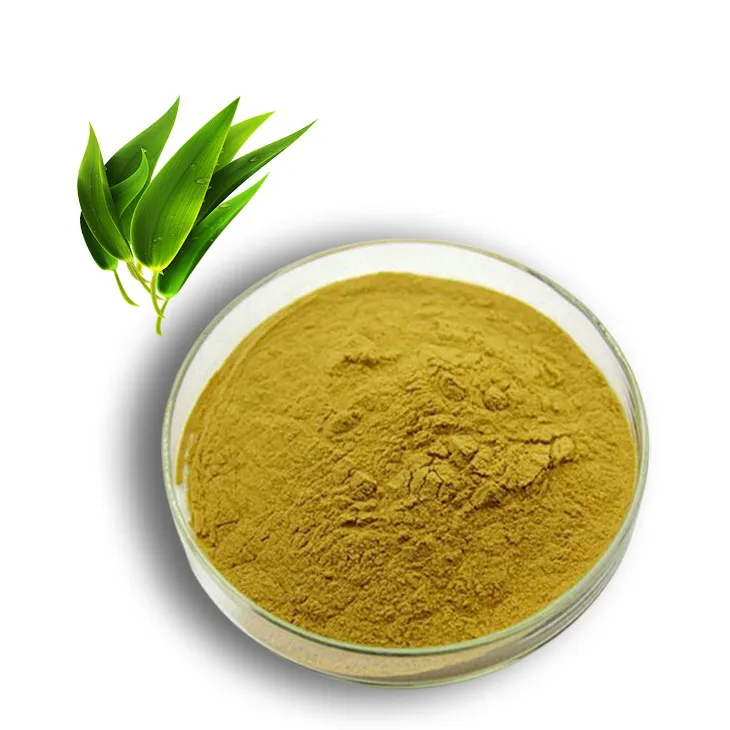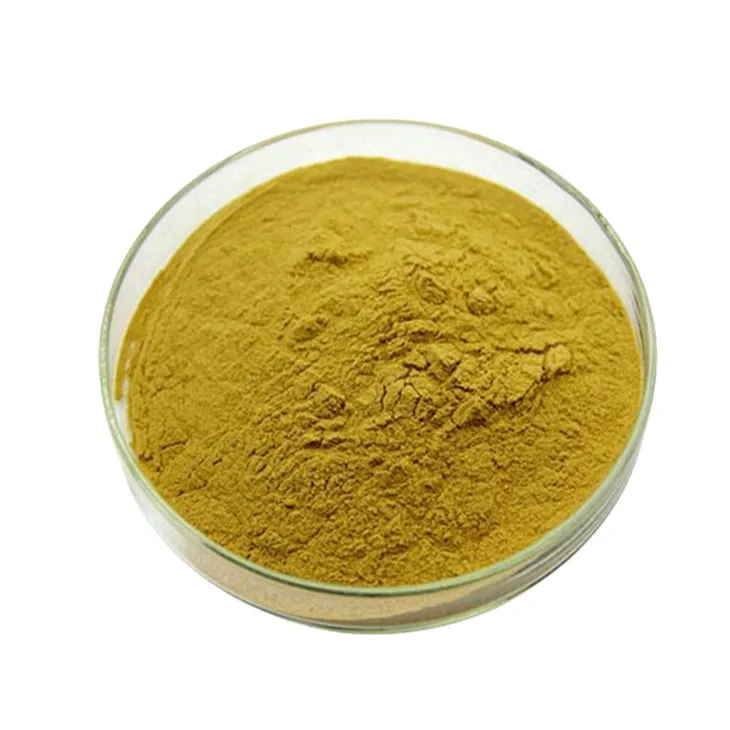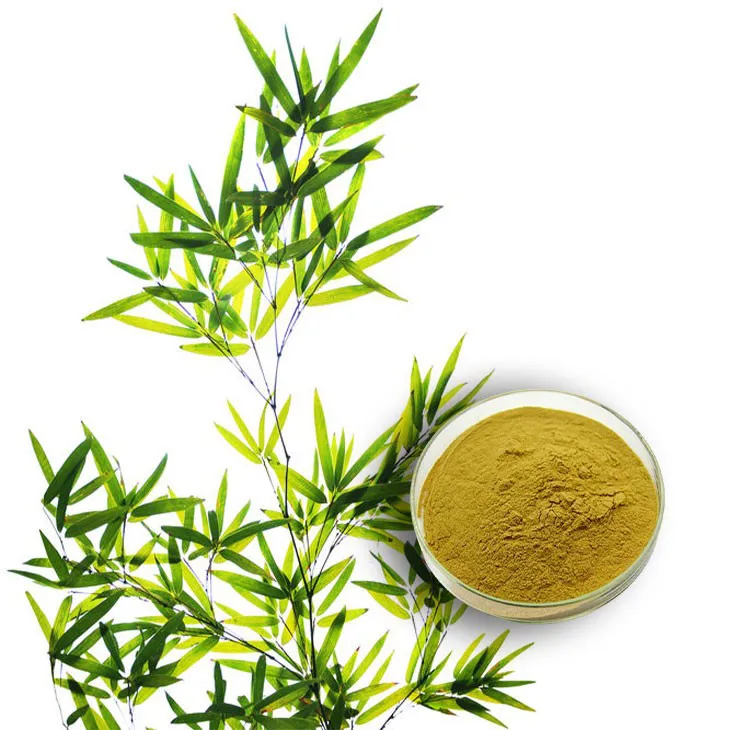- 0086-571-85302990
- sales@greenskybio.com
The Most Well - Received Bamboo Leaf Extracts.
2024-11-30

1. Introduction to Bamboo Leaf extract
Bamboo Leaf extract has been gaining significant attention in recent years as a valuable natural product. It is derived from the leaves of bamboo, which is a plant known for its fast - growing and widespread presence in various regions around the world. The extract contains a rich blend of bioactive compounds that make it highly sought - after in multiple industries.

2. Chemical Composition of Bamboo Leaf extract
The chemical composition of bamboo leaf extract is quite complex and diverse. One of the key components are flavonoids, which play a crucial role in its functionality.
2.1 Flavonoids
Among the flavonoids present in bamboo leaf extract, orientin and isoorientin are of particular importance. These flavonoids are responsible for the extract's strong antioxidant potential. Antioxidants are substances that can neutralize free radicals in the body, which are unstable molecules that can cause damage to cells and contribute to various health problems such as aging, cancer, and cardiovascular diseases.
In addition to orientin and isoorientin, other flavonoids in the extract also contribute to its overall antioxidant activity. They work together to scavenge free radicals, protecting the body's cells from oxidative stress.
2.2 Other Compounds
Bamboo leaf extract also contains other bioactive substances such as phenolic acids. These compounds have their own unique properties and may interact with the flavonoids to enhance the overall effectiveness of the extract. For example, phenolic acids may contribute to the anti - inflammatory properties of the extract.

3. Applications in Nutraceuticals
The potential health - promoting benefits of bamboo leaf extract have led to its increasing use in the nutraceutical industry.
3.1 Antioxidant Properties for Health
As mentioned earlier, the antioxidant activity of bamboo leaf extract makes it a valuable addition to nutraceutical products. By consuming products containing bamboo leaf extract, individuals can potentially reduce the oxidative stress in their bodies. This may lead to a reduced risk of developing chronic diseases. For example, it may help in maintaining healthy skin by preventing premature aging caused by oxidative damage. It may also support cardiovascular health by reducing the oxidation of low - density lipoprotein (LDL) cholesterol, which is a major risk factor for heart disease.
3.2 Other Health Benefits
Some studies suggest that bamboo leaf extract may have anti - inflammatory properties. Inflammation is a natural response of the body to injury or infection, but chronic inflammation can be harmful and is associated with many diseases such as arthritis and diabetes. The anti - inflammatory effects of the extract may help in alleviating symptoms associated with these conditions.
There is also evidence indicating that bamboo leaf extract may have a positive impact on the immune system. A strong immune system is essential for protecting the body against various pathogens. The bioactive compounds in the extract may stimulate the immune cells, enhancing the body's defense mechanisms.

4. Research in the Pharmaceutical Field
In the pharmaceutical field, bamboo leaf extract is an area of active research, especially in relation to its role in treating certain diseases.
4.1 Anti - cancer Research
Some preliminary studies have explored the potential anti - cancer properties of bamboo leaf extract. The antioxidant and anti - inflammatory properties of the extract may play a role in inhibiting the growth of cancer cells. For example, the flavonoids in the extract may interfere with the signaling pathways that are involved in cancer cell proliferation. However, more in - depth research is needed to fully understand the mechanisms and to determine the effectiveness of bamboo leaf extract in cancer treatment.
4.2 Treatment of Cardiovascular Diseases
Given its potential to reduce LDL cholesterol oxidation and its anti - inflammatory effects, bamboo leaf extract is being investigated for its role in treating cardiovascular diseases. It may help in reducing blood pressure, improving blood vessel function, and preventing the formation of blood clots. These effects could potentially be beneficial for patients with hypertension, atherosclerosis, and other cardiovascular disorders.

5. Applications in the Agricultural Domain
Bamboo leaf extract has also shown promise in the agricultural domain as a natural alternative to pesticides.
5.1 Natural Pesticide Alternative
Many conventional pesticides are harmful to the environment and can have negative impacts on non - target organisms. Bamboo leaf extract, on the other hand, contains compounds that can act as natural pesticides. For example, some of the bioactive substances in the extract may have insect - repellent properties. They can deter pests from attacking crops without causing the same level of harm to the environment as chemical pesticides.
Moreover, bamboo leaf extract may also have antifungal properties. Fungal infections can be a major problem in agriculture, causing damage to crops and reducing yields. The extract could potentially be used to prevent or treat fungal diseases in plants.
6. Production and Quality Control of Bamboo Leaf Extract
The production of bamboo leaf extract involves several steps to ensure its quality and effectiveness.
6.1 Harvesting of Bamboo Leaves
The first step is the proper harvesting of bamboo leaves. The leaves should be collected at the appropriate time to ensure that they contain the maximum amount of bioactive compounds. Usually, young and healthy leaves are preferred as they tend to have a higher concentration of the desired substances.
6.2 Extraction Methods
There are various extraction methods available for obtaining bamboo leaf extract. Common methods include solvent extraction, where solvents such as ethanol or water are used to extract the bioactive compounds from the leaves. The choice of solvent can affect the composition and quality of the extract. Another method is supercritical fluid extraction, which uses supercritical fluids like carbon dioxide to extract the compounds. This method has the advantage of producing a cleaner extract with less solvent residue.
6.3 Quality Control
Quality control is crucial in the production of bamboo leaf extract. Parameters such as the concentration of bioactive compounds, purity, and absence of contaminants need to be monitored. Analytical techniques such as high - performance liquid chromatography (HPLC) are often used to determine the composition of the extract and to ensure that it meets the required standards.
7. Market Trends and Future Prospects
The market for bamboo leaf extract has been growing steadily in recent years, driven by the increasing demand for natural products with health and environmental benefits.
7.1 Current Market Situation
Currently, bamboo leaf extract is mainly used in the nutraceutical and cosmetic industries. In the nutraceutical market, it is available in various forms such as capsules, tablets, and powders. In the cosmetic industry, it is used in products like creams and lotions for its antioxidant and skin - protecting properties.
7.2 Future Opportunities
As research on bamboo leaf extract continues to progress, there are several future opportunities. In the pharmaceutical industry, if more conclusive evidence is found regarding its efficacy in treating diseases, it could lead to the development of new drugs. In the agricultural sector, its use as a natural pesticide could expand, reducing the reliance on chemical pesticides.
However, there are also challenges. For example, standardization of the extract is still an issue, as different extraction methods and sources of bamboo leaves can result in variations in the composition of the extract. Additionally, more research is needed to fully explore its potential benefits and to address any safety concerns.
FAQ:
What are the main components of bamboo leaf extract?
The main components of bamboo leaf extract include flavonoids such as orientin and isoorientin, which contribute to its antioxidant potential. There are also other substances in it that together form its chemical composition.
Why is bamboo leaf extract used in nutraceuticals?
Bamboo leaf extract is used in nutraceuticals because of its potential health - promoting benefits. These benefits are related to its chemical composition, such as the antioxidant flavonoids, which may have positive effects on human health.
What research is being done on bamboo leaf extract in the pharmaceutical field?
In the pharmaceutical field, research is being conducted on bamboo leaf extract's role in treating certain diseases. However, specific diseases are still under exploration, and scientists are studying how the components in the extract interact with the human body to potentially combat diseases.
How does bamboo leaf extract act as a natural pesticide alternative in agriculture?
Bamboo leaf extract shows promise as a natural pesticide alternative in agriculture. It may have certain properties or substances that can help in pest control without the negative impacts associated with some chemical pesticides. The exact mechanisms are still being investigated.
Are there any side effects of using bamboo leaf extract?
As of now, while bamboo leaf extract is generally considered safe, more research is needed to fully understand potential side effects. Since it is a natural product, it is often assumed to have fewer side effects compared to some synthetic substances, but individual sensitivities may vary.
Related literature
- Antioxidant Activity of Bamboo Leaf Extracts: A Review"
- "The Potential of Bamboo Leaf Extract in Pharmaceutical Applications"
- "Bamboo Leaf Extract as a Natural Pesticide: Current Research and Future Prospects"
- ▶ Hesperidin
- ▶ citrus bioflavonoids
- ▶ plant extract
- ▶ lycopene
- ▶ Diosmin
- ▶ Grape seed extract
- ▶ Sea buckthorn Juice Powder
- ▶ Beetroot powder
- ▶ Hops Extract
- ▶ Artichoke Extract
- ▶ Reishi mushroom extract
- ▶ Astaxanthin
- ▶ Green Tea Extract
- ▶ Curcumin Extract
- ▶ Horse Chestnut Extract
- ▶ Other Problems
- ▶ Boswellia Serrata Extract
- ▶ Resveratrol Extract
- ▶ Marigold Extract
- ▶ Grape Leaf Extract
- ▶ blog3
- ▶ blog4
-
100% Pure Organic Dandelion Leaf Extract.
2024-11-30
-
Chinese Bitter Melon Extract Suppliers.
2024-11-30
-
Suppliers of Organic Vitamin C Powder.
2024-11-30
-
Organic non - GMO Vitamin B6.
2024-11-30
-
Dandelion Leaf Extract
2024-11-30
-
Tamarind extract powder
2024-11-30
-
Lemon Balm Extract
2024-11-30
-
Lily extract
2024-11-30
-
Wheat Germ Extract
2024-11-30
-
Angelica sinensis extract
2024-11-30
-
Green Tea Extract
2024-11-30
-
Senna Leaf Extract
2024-11-30
-
Buckthorn bark extract
2024-11-30
-
Yohimbine Bark Extract
2024-11-30





















